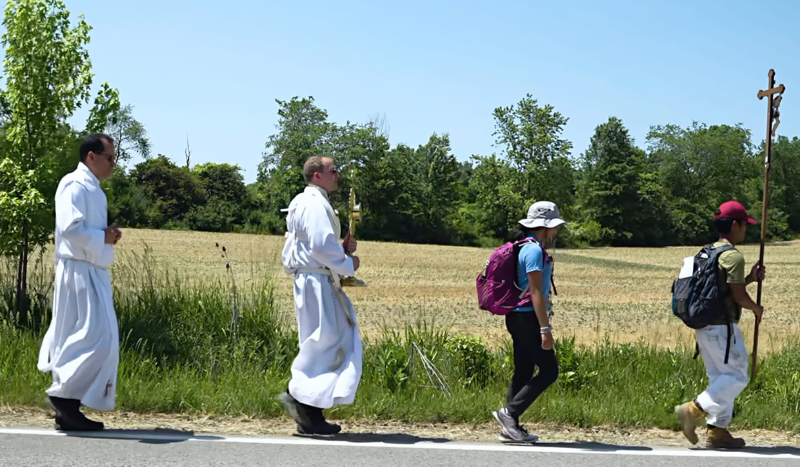
Screenshot from Truth Charting Instagram Video
CV NEWS FEED // Four Eucharistic processions will traverse across the country next summer as part of the National Eucharistic Revival, spreading the beauty and truth of the Eucharist but creating a logistical challenge for the organizers. To prepare and test different practices for the nationwide pilgrimage, a test pilgrimage was undertaken to prepare for next year.
Modern Catholic Pilgrim, the organizer of next year’s processions, invited a priest, videographer, a lay woman preparing to enter a cloister, and an undergrad student at the University of Notre Dame to join Will Peterson, the executive director of Modern Catholic Pilgrim, to be “test” perpetual pilgrims on an 8-day, 100-mile test procession to understand the trials and joys of an extended pilgrimage.
Modern Catholic Pilgrim is a national non-profit that specializes in planning and organizing a variety of different pilgrimages. The National Eucharistic Revival Board hired the group to help organize and manage the logistics of the four national pilgrimages set to take place next summer.
During the trial pilgrimage, the pilgrim’s day-to-day routine resembled what will be the daily experience of pilgrims during the national pilgrimage. The pilgrims began each day with Mass and a solemn one-mile procession with local parishioners. Then, they processed over 10 miles and concluded the day with Benediction. At night, they stayed with host families from the local parish.
As they journeyed, cars slowed down to observe the spectacle and local parishioners joined in for the day to walk with the pilgrims. As they walked, the pilgrims said multiple rosaries, prayed the Divine Mercy Chaplet, and quietly chatted with their fellow pilgrims. All while providing a powerful witness to the communities they processed through.
“One of the very surprising things for me is that we really dove in to meet these communities—to get to know them,” said perpetual pilgrim John Donahue in an interview with the Pillar. “It’s been such a blessing for me to get to know these families and communities, especially at the host houses, and to get to pray with them.”
An extended, outdoor procession presents a multitude of problems, both concerning the participants safety and well-being and how to maintain reverence for the Eucharist. Fr. Stephen Felicichia, a diocesan priest from the Fort Wayne-South Bend diocese and former soldier, sought to preserve reverence during every step of the journey.
“To the best of my ability, (the procession) is as reverent as you can make it,” said Fr. Felicichia. “How reverent? Well, we’re walking on roads and adapting to things on the fly. There are certain things you can’t do and certain things you can because you’re carrying the God of the universe with you.”
Felicichia supported the monstrance with a custom harness that bore some of the burden of the heavy monstrance. During lunch and other breaks, Felicichia would repose the Blessed Sacrament in a simple wooden tabernacle in the back of the support vehicle, and a pilgrim would stand vigil with the tabernacle during the duration of the break.
Even with a well-thought-out plan, there were still moments when the priest had to adapt to maintain reverence as difficult situations arose such as a passerby approaching that wanted to chat with him.
“What is my goal here? My goal isn’t to offend the Lord; my goal is to maintain as much reverence as I can, and I’m doing the best I can with what I have,” Felicichia said.
The practice pilgrimage taught the organizers many practical lessons, such as how to better communicate with parish organizers.
While questions remain, organizers are excited about how many lives the national pilgrimage will touch as the Eucharist is processed across the nation.
Along with a priest, 12 young adults will walk from a launch city to Indianapolis, where all four routes will convene for the National Eucharistic Congress from July 17–21. Local Catholics will be invited to join in the procession for a day.
“For this pilgrimage and for next year—hopefully it takes you one step deeper in discipleship,” said Peterson. “I can’t say for certain how that’s going to affect people and what that might do. But there’s hope there for a real transformation.”

